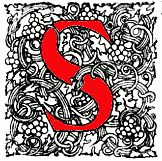This passage appears in Housman's autobiography, The Unexpected Years, where he discusses his time at Art School at Kensington. Housman created the decorated initial for his The Field of Clover (1898) — George P. Landow.

ometimes I have very much wished to become intimate with people who had not the corresponding desire; and sometimes I have avoided meeting those whom I after wards discovered to be, more than most, the very people I was in search of not knowing that they existed. The benefit that has come from those foolishly delayed meetings has, I would like to hope, been mutual; but in one instance at least the heavier debt has remained so much mine, that I would like to tell its story beginning with an avoid ance on my part which remained effective for five or six years: a similar case to my encounter with those two closed volumes of William Blake, which I might have opened to my exceeding great delight, but did not.
It happened during my early years in London; I went to a musical at home, and heard that, in an interval of the music, there was to be recitation. One of the reciters was pointed out to me a comely, and rather stout lady dressed in blue velvet; and she was to be followed by a boy-genius, her own son, whom she had herself trained in voice-production. It was a hot afternoon; and to hear a lady who had characterized herself in blue velvet, and after her a boy-genius of home-production, was, I thought, something to be avoided. And I had at least this excuse, that there was at that time a fashion for drawing-room recitations so crude and incompetent that they made one's flesh creep. And so, just before the blue velvet took up its position, I made the unfortunate mistake of creeping unobtrusively away, and so missed hearing a quite good reciter, and after her the man (then only a boy) whose knowledge, and manipulative skill in the rendering of English for dramatic purposes I came afterwards to put in a class all by themselves Granville Barker.

Granville Barker by William Rothenstein. [Click on image to enlarge it.]
Some years later, I saw him for the first time on the stage taking the part of Eugene in Candida; and thereafter I hunted among my friends till I found one who could bring us together; a service which I owe to the kindness of Alfred Sutro. At the time nothing more came of it; I had no plans then of collaboration, or even of writing for the stage, it was simply a case of intellectual satisfaction at meeting an actor who had brains as well as temperament, and was apparently without vanity. We did not meet again for a year or two; and then during the discussion over a Shakespearean lecture of his at which I was present, he gave me one of the surprises of my life saying that I was one of the people whom he wanted to persuade to write for the English stage.
I asked him afterwards if he really meant it. He assured me that he did. And the proof of his sincerity was that a year afterwards he came and asked me if I would write a play — a grown-up fairy-tale play he called it, for the Barker-Vedrenne Management then about to start at the Court Theatre; and when he did so God gave me the grace to say that I could not do it alone; but only if he would do it with me.
And that was the how and the why of our joint production of Prunella. And when people, unnecessarily curious, ask how much of it was his, and how much of it was mine, I can only truthfully tell them that in that happy collaboration the yard-measure had no place, and the only fact which mattered was that his joint authorship made the play twice as good as it would otherwise have been. There was also the added satisfaction, rare in the history of collaborative play-writing we never quarrelled, and have remained friends to this day. [130-32]
Barker was a wonderful coach; he knew exactly when to bully me, and when to let me alone. It had been so all through our collaboration over Prunella: and so also, when I set to work on The Chinese Lantern, I knew that it was mainly through Barker that I had learned my job, having got to it too late in life to have the instinctive sense of dramatic technique, which comes early to the born playwright. Fifteen years spent in literary composition is a hindrance not a help to the writing of stage-dialogue: your story-writer relies too much on fhe printed word, and leaves too little to the actor. Again and again Barker's cuts to my over-valuation of words left me amazed, but they also taught me; and when, quite recently, I sent him my last book of plays, and received in return his assurance that I had now learned my job, I was happy in being so commended by one who had never let me off lightly or himself either. [241]
Bibliography
Housman, Laurence. The Unexpected Years. London: Jonathan Cape, 1936.
Last modified 17 November 2012